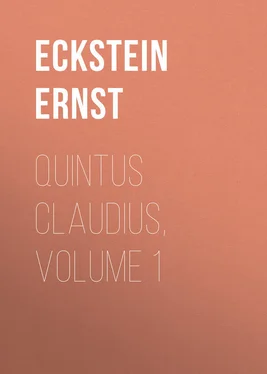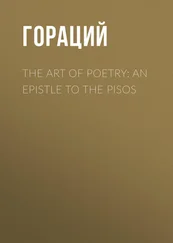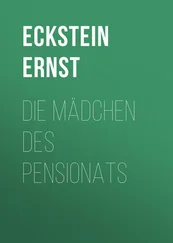Ernst Eckstein - Quintus Claudius, Volume 1
Здесь есть возможность читать онлайн «Ernst Eckstein - Quintus Claudius, Volume 1» — ознакомительный отрывок электронной книги совершенно бесплатно, а после прочтения отрывка купить полную версию. В некоторых случаях можно слушать аудио, скачать через торрент в формате fb2 и присутствует краткое содержание. Жанр: foreign_antique, foreign_prose, на английском языке. Описание произведения, (предисловие) а так же отзывы посетителей доступны на портале библиотеки ЛибКат.
- Название:Quintus Claudius, Volume 1
- Автор:
- Жанр:
- Год:неизвестен
- ISBN:нет данных
- Рейтинг книги:4 / 5. Голосов: 1
-
Избранное:Добавить в избранное
- Отзывы:
-
Ваша оценка:
- 80
- 1
- 2
- 3
- 4
- 5
Quintus Claudius, Volume 1: краткое содержание, описание и аннотация
Предлагаем к чтению аннотацию, описание, краткое содержание или предисловие (зависит от того, что написал сам автор книги «Quintus Claudius, Volume 1»). Если вы не нашли необходимую информацию о книге — напишите в комментариях, мы постараемся отыскать её.
Quintus Claudius, Volume 1 — читать онлайн ознакомительный отрывок
Ниже представлен текст книги, разбитый по страницам. Система сохранения места последней прочитанной страницы, позволяет с удобством читать онлайн бесплатно книгу «Quintus Claudius, Volume 1», без необходимости каждый раз заново искать на чём Вы остановились. Поставьте закладку, и сможете в любой момент перейти на страницу, на которой закончили чтение.
Интервал:
Закладка:
“Ah! you like him then?”
“Particularly. Do you know it would be delightful if he could remain here a little longer – I mean for six or eight days. Then he could travel with us to Rome.”
“Indeed?” said Quintus significantly.
“Now, what are you thinking of?”
“I? of nothing at all.”
“Go, there is no doing anything with you. Do not you see that I only meant, the long days of travelling all by ourselves – Claudia turns over a book, and you, you old lazy-bones, lie on a couch like an invalid – I find it desperately dull. A travelling companion seems to me to be the most desirable thing in the world – or do you dislike Caius Aurelius?”
“Oh no. If only his trireme had wheels and could travel over land.”
“His ship will take care of itself. He can come with us in the travelling chariot, and then he will be able to see part of the Appian way. 103 103 Appian way. The Via Appia , built by one of the Claudia gens (the Censor Appius Claudius Caecus, 312 B.C.) led from Rome across Capua to Brundisium (the modern Brindisi). Statius ( Silv. II, 12), calls it the queen of roads ( regina viarum ). A large portion of its admirable pavement, as well as the ruins of the tombs on its sides, exist at the present day.
It is a thousand times more interesting than a sea-voyage. – Now, do it to please me and turn the conversation on the subject at dinner to-day.”
“If you like,” said Quintus.
A slave now appeared on the threshold of the passage, which led from the peristyle to the atrium.
“My lord,” he said: “Letters have arrived from Rome – and for you too, Madam…”
“Then bring them out here.”
They were three very dissimilar letters, that Blepyrus handed to the two young people. Lucilia’s was from the high-priest of Jupiter; Titus Claudius Mucianus wrote as follows to his adopted daughter:
“Health and Blessings! 104 104 Health and Blessings! The Romans always began their letters by mentioning the writer’s name, who wishes health and blessings to the person addressed. Thus the commencement of the letter given here, literally interpreted, should have run as follows: Titus Claudius Mucianus wishes his Lucilia, Health and Blessings. T. Claudius Mucianus Luciliae suae, S.P. D.
I promised you lately, through Octavia, your excellent mother, that my next letter should be addressed to you, my dear daughter. I know that you value such proofs of my fatherly remembrance, and I am glad that it should be so. However, what I have to write does not concern you alone, my sweet Lucilia, but all of you. The preparations for the magnificent Centennial Festival, 105 105 Centennial festival. A brilliant spectacle in the arena, the amphitheatre, etc., which, as its name implies, was celebrated every hundred years. Domitian, however, disregarded the necessity of an interval of a hundred years, by reckoning, as Suetonius ( Dom. 4) relates, from the one before the last, which took place under Augustus, instead of from the very last, that was celebrated in the reign of Claudius. In this romance the time of the Domitian centennial festivities is placed somewhat later than they really occurred.
which the Emperor Domitian – as you know – proposes to hold in the course of next year, have so completely taken up my time during the last few weeks, that I am sorely in need of the rest and comfort of regular family life. In addition to this, political disturbances of all kinds have occurred. Caesar has sent for me six times to Albanum, 106 106 Albanum. Domitian (Suet. Dom. 4) had an estate at the foot of the Albanian Hills, and many rich Romans had summer villas near, forming at last the town now called Albano.
and I assure you it has been incessant travelling to and fro. The matter is an open secret; all Rome is discussing the decrees from the Palatine 107 107 Palatine. Palatium, the imperial palace on the Palatine Hill. The word “palace” is derived from “Palatium,” as “Kaiser” comes from "Caesar.”
against the Nazarenes. 108 108 Nazarenes. The name usually given to Christians, who, for a long time were regarded by the Romans as a Jewish sect. See the words of Dio Cassius (LXVII, 16): “who inclined to Judaism,” where he refers to the Christians, who were persecuted under Domitian.
You may remember that superstitious sect of whom Baucis spoke to you – a revolutionary faction, who, a score or so of years since, stirred up the whole city and gave occasion for the stern enactments of the divine Nero? Now again they are stirring up revolt as if they were mad; they are shaking the very foundations of society, and threaten to overturn all that we have till now held most sacred. I must be silent as to personal affairs; enough to say that I am weary and overwrought, and that my heart longs to see you all again. I beg you therefore to make ready to start and return as soon as possible to the City of the Seven Hills. Your mother is now tolerably well again – thanks to all-merciful Jupiter – and Quintus will not be vexed to learn that Cornelia is now staying in Rome again. People are quitting their country homes somewhat early this year; it is long since I have passed the month of September so endurably. I shall expect you then, at latest, by Tuesday in next week. Allowing three days for the journey, I thus give you two days to prepare for it.
“Pray greet your mother and your sister lovingly from me. This letter will, I hope, find you all in perfect health. I, for my part, am quite well.
“Written at Rome, on the 11th September, in the year 848 after the building of the city.”
The second letter was from Cornelia, Quintus’ betrothed, and ran as follows:
“Cornelia embraces her dear Quintus a thousand times. Here I am in Rome again, my beloved! My term of banishment to that odious desert at Tibur is ended. But, woe is me! Rome is dead and deserted too since you, my treasure, my idol, linger still far from the Seven Hills! Oh! how glad I am to hear from your father, that he is recalling you from Baiae sooner than was intended. Oh! Quintus, if you felt only one thousandth part of what I feel, you would fly on the wings of the storm to the arms of your love-sick Cornelia. The days at Tibur were more dreary than ever. My uncle seemed to me so depressed and tormented by gloomy thoughts. To crown my misery, old Cocceius Nerva 109 109 M. Cocceius Nerva from Narnia in Umbria, born 32 A.D., a senator.
must come and pay us a visit of eight mortal days. I shall never forget that week as long as I live! You know that when those two old men sit together, the house is as silent as a tomb; every one goes about on tiptoe. This Cocceius Nerva has the worst effect on my uncle. Only fancy what happened on the day when he left. My uncle had accompanied him to his chariot, and when he came back into the house he happened to pass my room, where Chloe was just putting some fresh roses into my hair. When he saw this, he fell into an indescribable fit of rage. ‘You old fool!’ he exclaimed pushing my good Chloe aside: ‘Have you women nothing to think of but finery? Do you deck yourselves out like beasts for sacrifice? Away with your rubbish! the house of Cornelius Cinna is no place for roses!’ And then he turned upon me in a tone which expressed volumes – ‘Wait a while!’ he said. ‘You will soon be able to do whatever pleases your fancy!’ You understand Quintus, he meant to refer to you. His words cut me to the heart, for I have known a long time that my uncle is not pleased at our connection. If my blessed mother had not made him swear, on her deathbed, that he would leave my choice perfectly free, who knows what might not have happened. Nevertheless, it is always a fresh pang to me when I see how he cherishes a bitter feeling against you – for, in spite of everything, I respect and love him.
Интервал:
Закладка:
Похожие книги на «Quintus Claudius, Volume 1»
Представляем Вашему вниманию похожие книги на «Quintus Claudius, Volume 1» списком для выбора. Мы отобрали схожую по названию и смыслу литературу в надежде предоставить читателям больше вариантов отыскать новые, интересные, ещё непрочитанные произведения.
Обсуждение, отзывы о книге «Quintus Claudius, Volume 1» и просто собственные мнения читателей. Оставьте ваши комментарии, напишите, что Вы думаете о произведении, его смысле или главных героях. Укажите что конкретно понравилось, а что нет, и почему Вы так считаете.












